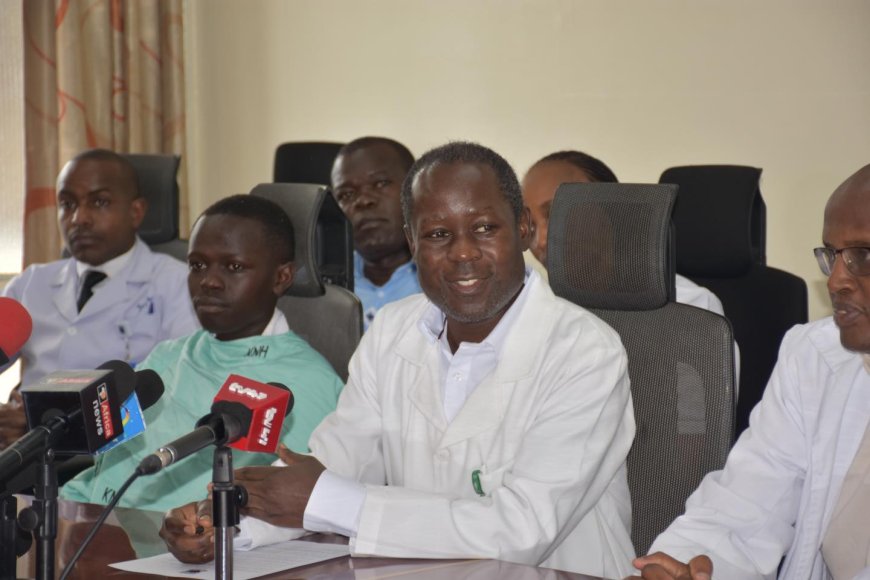Details Of World's First One-Of-A-Kind Surgery Done At KNH
The hospital revealed it had become the first in the world to perform a Transhumeral Targeted Sensory Reinnervation (TSR) procedure.

Kenyatta National Hospital (KNH) has made medical history after successfully carrying out a groundbreaking surgery on 22-year-old software engineering student Moses Mwendwa.
In a statement released on May 6, the hospital revealed it had become the first in the world to perform a Transhumeral Targeted Sensory Reinnervation (TSR) procedure.
This is an innovative surgery designed for individuals with above-the-elbow (transhumeral) amputations. It involves rerouting the sensory nerves that once served the missing limb to new areas of the body, often the chest or upper arm.
By transferring these nerves to different skin regions, surgeons create new pathways for sensory input. When touched, these reinnervated skin areas send signals to the brain that are interpreted as coming from the missing limb.

Moses Mwendwa (left) and KNH doctors involved in his surgery during the press conference on Tuesday, May 6, 2025. /KNH
This can help amputees "feel" sensations—like pressure or touch—from a prosthetic arm, making it more lifelike and intuitive to use.
TSR is especially significant for patients using advanced prosthetic limbs that are equipped with sensors. With this procedure, users can receive real-time feedback from their prosthetic, improving control, reducing phantom limb pain, and enhancing overall functionality.
This represents a major leap forward in neuroprosthetics and patient-centred rehabilitation. "We have performed the World’s First Transhumeral Targeted Sensory Reinnervation (TSR) surgery on Moses Mwendwa, 22, restoring sensation in his missing left hand!"
This groundbreaking 7-hour procedure reroutes nerves to create a "sensory map," enabling touch perception and better prosthetic control," stated KNH in part.
The hospital explained that amputation frequently results in phantom limb sensations—imaginary feelings or perceptions of the amputated body part. These sensations are often accompanied by pain, discomfort, and psychological distress.
The surgery, which lasted seven hours, was performed by a team of doctors from various specialities across different facilities.
Mwendwa lost his arm due to compartment syndrome, a life-threatening condition, after a fall on the stairs in January. His left arm was amputated above the elbow on January 12.
After months of physical and emotional recovery, he was allowed to participate in KNH's groundbreaking TSR Surgical Camp, which ran from April 28 to May 2. The historic surgery took place on April 29 and was a success.
The surgery team included Prof. Ferdinand Nang'ole (Consultant Plastic Surgeon, KNH/UoN), Dr. Benjamin Wabwire (Head of Plastic & Reconstructive Surgery, KNH), and Prof. Alexander Gardetto (Plastic & Reconstructive Surgery Specialist, Italy).
They were supported by Dr. Dorsi Jowi, consultant plastic surgeon at KNH; Dr. Christine Nyabuto, chief resident in plastic surgery at UoN; and Dr. Rachel Machiya, a resident orthopaedic surgeon from UoN.
Additional support came from the anaesthesia team, led by Dr. John Mwanzia and Dr. Ruth Nyambura, with the nursing team headed by Erick Odongo, assisted by Mercy Chepkemoi and Esther Munga. Catherine Muthengi also played a vital role as the theatre's sterile assistant.
Dr. Wabwire commented, "By creating this neural hand map, we're not just restoring sensation – we're enabling better prosthetic control and pain management, fundamentally transforming what's possible for amputees through plastic and reconstructive surgery."







